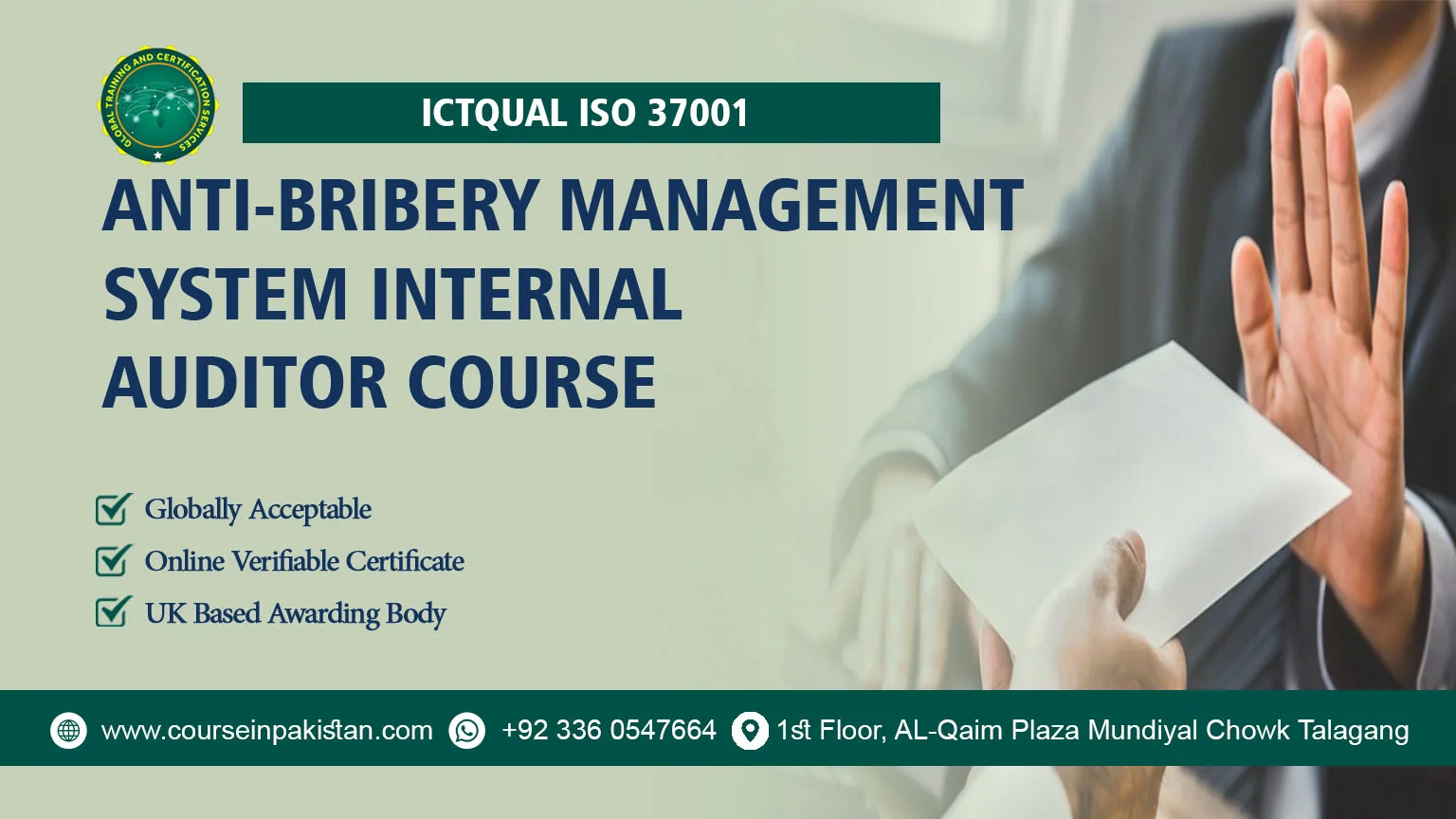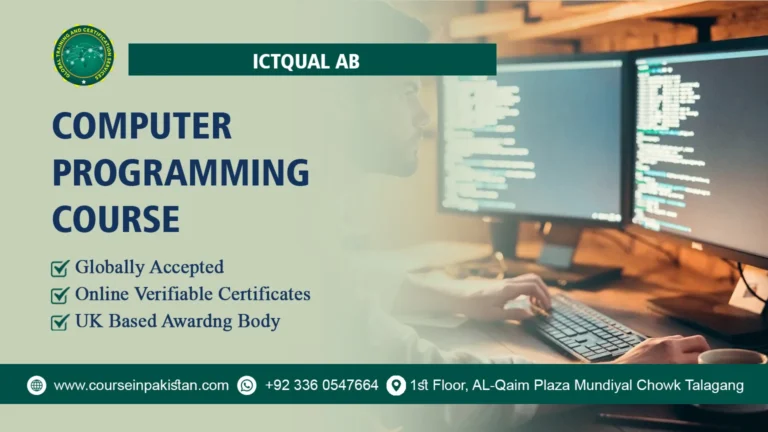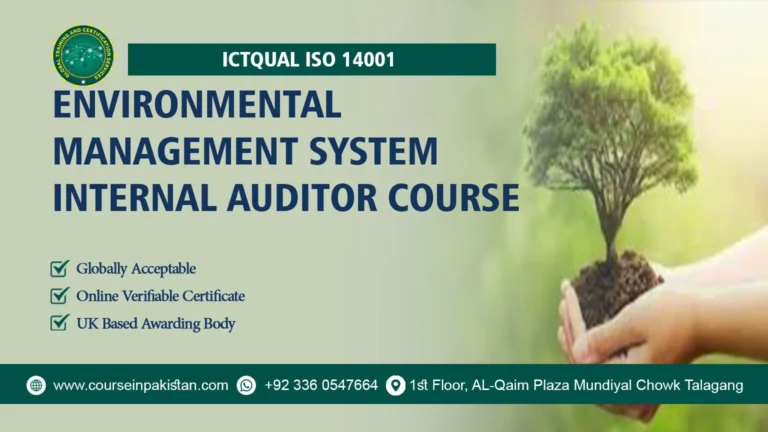
ICTQual ISO 37001 Anti-Bribery Management System Internal Auditor Course
In today’s global business landscape, combating bribery and corruption is critical for maintaining ethical standards, fostering trust, and ensuring legal compliance. The ISO 37001 standard provides a framework for implementing an Anti-Bribery Management System (ABMS), enabling organizations to prevent, detect, and address bribery risks effectively. The ISO 37001 Anti-Bribery Management System Internal Auditor Course equips professionals with the skills and knowledge required to audit ABMS processes based on this international standard.
Course Introduction
The ISO 37001 Internal Auditor Course focuses on understanding the principles, methodologies, and best practices of Anti-Bribery Management Systems as outlined in ISO 37001. Participants will learn how to conduct audits to evaluate the effectiveness of ABMS processes in preventing bribery and corruption within organizations.
Course Overview
Throughout the course, participants will explore essential concepts related to anti-bribery management, internal auditing principles, audit techniques, and methodologies specific to ISO 37001. Practical exercises and case studies provide hands-on experience in planning, conducting, reporting, and following up on audits of ABMS processes. The course emphasizes aligning anti-bribery practices with organizational objectives, regulatory compliance, and international standards.
Course Benefits
- Comprehensive Understanding: Gain a thorough understanding of ISO 37001 standards and anti-bribery management principles.
- Auditing Expertise: Develop auditing skills to assess ABMS processes effectively and identify areas for improvement.
- Global Recognition: Obtain a globally recognized qualification demonstrating competence in auditing anti-bribery management.
- Risk Mitigation: Enhance organizational resilience by identifying and mitigating bribery and corruption risks.
- Career Advancement: Expand career opportunities in compliance, risk management, and internal auditing roles focused on anti-bribery practices.
Course Study Units
The course typically covers essential topics such as:
- Introduction to Anti-Bribery Management Systems
- Fundamentals of Internal Auditing
- Understanding ISO 37001 Requirements
- Risk Assessment and Mitigation Strategies
- Conducting Audit Activities
- Reporting and Follow-Up
- Ethical Considerations and Integrity
- Continuous Improvement and Professional Development
Learning Outcomes
1. Introduction to Anti-Bribery Management Systems
Learning Outcomes:
- Understand the significance of Anti-Bribery Management Systems (ABMS) in fostering ethical business practices.
- Identify key components and objectives of ISO 37001 and its role in combating bribery and corruption.
- Recognize the benefits of implementing ABMS to enhance organizational integrity and compliance.
2. Fundamentals of Internal Auditing
Learning Outcomes:
- Define the principles, objectives, and benefits of internal auditing within the context of ABMS.
- Identify the roles, responsibilities, and competencies required of internal auditors in auditing ABMS processes.
- Apply auditing principles to plan, conduct, report, and follow up on audits effectively and ethically.
3. Understanding ISO 37001 Requirements
Learning Outcomes:
- Gain a comprehensive understanding of the ISO 37001 standard and its requirements for ABMS.
- Interpret the framework and guidelines provided by ISO 37001 for implementing and maintaining an effective ABMS.
- Align organizational practices with ISO 37001 standards to mitigate bribery and corruption risks effectively.
4. Risk Assessment and Mitigation Strategies
Learning Outcomes:
- Develop methodologies for identifying, assessing, and prioritizing bribery and corruption risks within organizations.
- Implement risk mitigation strategies and controls to prevent potential instances of bribery.
- Evaluate the effectiveness of risk assessment and mitigation measures in minimizing bribery and corruption risks.
5. Conducting Audit Activities
Learning Outcomes:
- Plan and prepare for ABMS audits based on ISO 37001 requirements and organizational objectives.
- Conduct systematic and objective audits to evaluate the effectiveness of ABMS processes and controls.
- Identify non-conformities, weaknesses, and areas for improvement in ABMS practices through audit findings.
6. Reporting and Follow-Up
Learning Outcomes:
- Prepare clear and concise audit reports that communicate findings, conclusions, and recommendations effectively.
- Provide actionable insights and recommendations based on audit results to improve ABMS practices.
- Monitor and track the implementation of corrective actions to address identified deficiencies and enhance ABMS capabilities.
7. Ethical Considerations and Integrity
Learning Outcomes:
- Uphold ethical standards and integrity in auditing ABMS processes and activities.
- Demonstrate impartiality, independence, and fairness throughout the auditing process.
- Promote a culture of transparency and accountability in preventing bribery and corruption within organizations.
8. Continuous Improvement and Professional Development
Learning Outcomes:
- Foster a culture of continuous improvement in ABMS practices and processes.
- Implement feedback mechanisms and lessons learned from audits to enhance ABMS effectiveness.
- Pursue ongoing professional development to stay updated with emerging trends, best practices, and evolving standards in anti-bribery management.
By mastering these learning outcomes across the study units of the ISO 37001 Internal Auditor Course, participants will acquire the knowledge and skills necessary to effectively audit, enhance, and maintain Anti-Bribery Management Systems aligned with ISO 37001 standards. This expertise enables organizations to uphold ethical standards, prevent bribery and corruption, and maintain trust with stakeholders in an increasingly regulated and scrutinized business environment. The course is essential for individuals involved in overseeing, auditing, or implementing anti-bribery management processes within their organizations, ensuring they are well-prepared to mitigate bribery risks and uphold integrity in business practices.
Who is This Course For?
This course is ideal for:
- Compliance Officers: Responsible for implementing and managing ABMS within organizations.
- Internal Auditors: Looking to specialize in auditing anti-bribery management practices and systems.
- Risk Managers: Involved in assessing and mitigating bribery and corruption risks.
- Legal and Regulatory Professionals: Ensuring adherence to anti-bribery management standards and regulatory requirements.
Future Progression for This Course
Upon completing the ISO 37001 Internal Auditor Course, participants can pursue further professional development and career advancement opportunities, such as:
- Lead Auditor Certification: Advance to become a certified lead auditor for ISO 37001, capable of leading external audits for certification purposes.
- Advanced Anti-Bribery Training: Explore specialized courses in forensic auditing, fraud examination, or corporate governance.
- Consultancy and Advisory Roles: Provide expert advice on anti-bribery management best practices and standards implementation to organizations globally.
- Organizational Leadership: Take on leadership roles in anti-bribery management, driving strategic initiatives for enhancing organizational integrity and compliance.
ISO 37001 Anti-Bribery Management System Internal Auditor Course equips professionals with the knowledge and skills necessary to audit, enhance, and maintain effective ABMS processes. By mastering ISO 37001 standards and auditing techniques, participants contribute to ensuring organizations uphold ethical standards, prevent bribery and corruption, and maintain trust with stakeholders in an increasingly complex and regulated business environment. This course is essential for anyone involved in overseeing, auditing, or implementing anti-bribery management processes within their organizations, ensuring they are well-prepared to navigate the challenges of bribery risks and uphold integrity in business practices.






